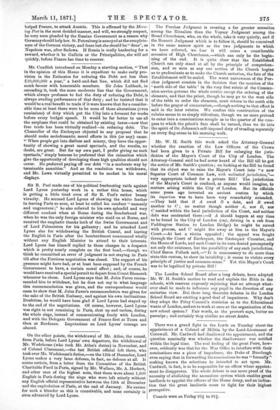Mr. Candlish introduced on Monday a startling motion, "That in
the opinion of this House it is expedient to make early pro- vision in the Estimates for reducing the Debt not less than 110,000,000 a year," a hard-and-fast line, which did not find much favour with honourable members. Sir John Lubbock, in seconding it, took the more moderate line that the Government, which always professes to feel the duty of reducing the Debt, is -always evading performance of that duty ; and he insisted that it would be a real benefit to trade if it were known that for a consider- able time at least there were to be none of those alterations (even remissions) of duty which put the City into a ferment for weeks before every budget speech. It would be far better to use all the surpluses that could be obtained by existing taxes—now that free trade has been virtually realized—in reducing debt. The Chancellor of the Exchequer objected to any proposal that he should make melodramatic moral efforts in this (or any) cause. "When people get into diseress and misery, they have the oppor- tunity of showing a great moral spectacle, and the results, no .doubt, are great. But for my own part, I prefer giving no such -spectacle," simply because he preferred that the calamities which give the opportunity of developing those high qualities should not -occur. He preferred paying off our debt "in a moderate way by 'terminable annuities." And so the resolution was withdrawn, and Mr. Lowe virtually permitted to be modest in his moral -displays.


































 Previous page
Previous page